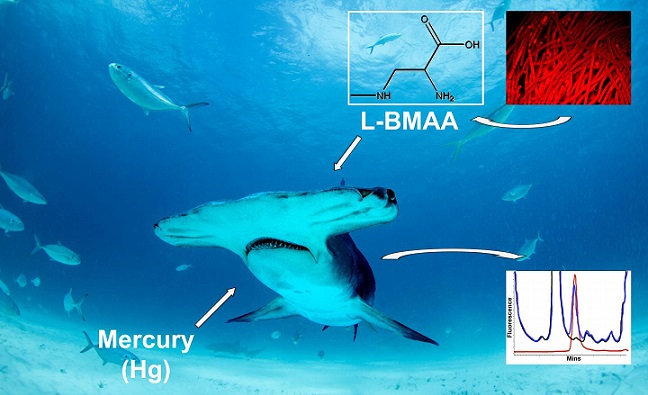Study finds shark fins & meat contain high levels of neurotoxins linked to Alzheimer's disease
Cyanobacterial neurotoxin β-N-methylamino-L-alanine (BMAA) and Mercury are detected in sharks from the Atlantic and Pacific Oceans
In a new study, University of Miami (UM) scientists found high concentrations of toxins linked to neurodegenerative diseases in the fins and muscles of 10 species of sharks. The research team suggests that restricting consumption of sharks can have positive health benefits for consumers and for shark conservation, since several of the sharks analyzed in the study are threatened with extinction due to overfishing.
Fins and muscle tissue samples were collected from 10 shark species found in the Atlantic and Pacific Oceans for concentrations of two toxins--mercury and β-N-methylamino-L-alanine (BMAA). "Recent studies have linked BMAA to neurodegenerative diseases such as Alzheimer's disease and amyotrophic lateral sclerosis (ALS)," said Deborah Mash, Professor of Neurology and senior author of the study.
Researchers at the UM Rosenstiel School of Marine and Atmospheric Science and UM Miller School of Medicine detected concentrations of mercury and BMAA in the fins and muscles of all shark species at levels that may pose a threat to human health. While both mercury and BMAA by themselves pose a health risk, together they may also have synergistic toxic impacts.
"Since sharks are predators, living higher up in the food web, their tissues tend to accumulate and concentrate toxins, which may not only pose a threat to shark health, but also put human consumers of shark parts at a health risk," said the study's lead author Neil Hammerschlag, a research assistant professor at the UM Rosenstiel School and UM Abess Center for Ecosystem Science and Policy.
Shark products including shark fins, cartilage and meat are widely consumed in Asia and globally in Asian communities, as a delicacy and as a source of traditional Chinese medicine. In addition, dietary supplements containing shark cartilage are consumed globally.
Recently scientists have found BMAA in shark fins and shark cartilage supplements. The neurotoxic methyl mercury has been known to bioaccumulate in sharks over their long lifespans.
About 16 percent of the world's shark species are threatened with extinction. The shark species sampled in this study range in threat status from least concern (bonnethead shark) to endangered (great hammerhead) by the International Union for Conservation of Nature (IUCN).
"Our results suggest that humans who consume shark parts may be at a risk for developing neurological diseases." said Mash.
"People should be aware and consider restricting consumption of shark parts. Limiting the consumption of shark parts will have positive health benefits for consumers and positive conservation outcomes for sharks, many of which are threatened with extinction due in part to the growing high demand for shark fin soup and, to a lesser extent, for shark meat and cartilage products." said Hammerschlag.
Source: University of Miami Rosenstiel School of Marine & Atmospheric Science
BİOLOGY NEWS
-
RNA from Trained Aplysia Can Induce an Epigenetic Engram for Long-Term Sensitization in Untrained Aplysia.
-
HOW WE BECOME HAPPY
-
More tomatoes, faster: Accelerating tomato engineering
-
Purest yet liver-like cells generated from induced pluripotent stem cells
-
Legions of nanorobots target cancerous tumors with precision
-
CRISPR gene editing reveals new therapeutic approach for blood disorders
-
Quantum dots with impermeable shell: A powerful tool for nanoengineering
-
Thousands on one chip: New method to study proteins
-
Gene Drive Technology: Where is the future?
-
Four newly identified genes could improve rice
-
Watching the luminescent gene switch
-
DNA damage by ultrashort pulses of intense laser light
-
Mantis shrimp inspires next generation of ultra-strong materials
-
Specialized life forms abound at Arctic methane seeps
-
Ocean warming and acidification impact on calcareous phytoplankton



